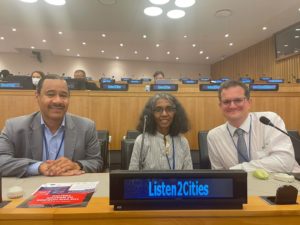Learning from engagement: insights and lessons from the 2022 High Level Political Forum on the SDGs
27 August 2022
Last month, a team of librarians from around the world engaged with governments at the UN in New York, building understanding of the role of libraries in development, and creating new links with decision-makers – including a national president! This article shares lessons and reflections from the team who attended.
The 2022 High Level Political Forum on the Sustainable Development Goals represented the highlight of the United Nations’ annual work programme around the 2030 Agenda. IFLA was present, with a great team of library representatives from five different continents:
- Ayanda Lebele (Botswana)
- Matseliso Moshoeshoe-Chadzingwa (Lesotho)
- Premila Gamage (Sri Lanka)
- Mara Jekabsone (Latvia)
- Alejandro Santa (Argentina)
- Odean Cole-Phoenix (Jamaica)
- Julius Jefferson (US)
- Loida Garcia Febo (US)
- Shauntee Simpson-Burns (US)
As set out in our summary news story, the team made good use of the time there to work with representatives of their governments, creating new connections and alliances to strengthen their advocacy at home. 2022 also saw the contribution of libraries made clear in plenary discussions!
Following up on the series of questions we asked the team before they came to New York (here, here and here), this article now shares their responses about their experience and insights after the event. You can also join many of them in our webinar on 22 September!
What one thing struck you most from your participation at HLPF?
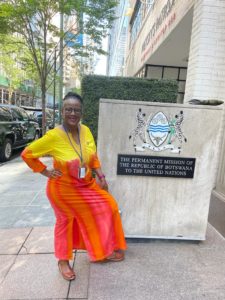
Ayanda: On the Sunday, we met on the balcony of the Stavros Niarchos Library. This was an informal meeting to dialogue on how to manage the engagement at the side event, but turned into more of a round table, with librarians talking to each other about what we should do to inform policy makers and all other non-library professions about how we should be part of developing strategies and programs in areas like:
– misinformation of societies
– academic dishonesty
– equipping society with digital skills
– inclusivity in meaningful access to information
– incorporating the SDGs into the library curriculum
It struck me that these are all points related to the emerging trends of readily available information and ICTs as processing tools. This discussion set the tone and mood of my participation throughout the HLPF 2022. I felt and sensed the voices of my fellow librarians in all the presentations that followed. This was even more pronounced by hearing similar sentiments as echoed in presentations of even non-librarians as they gave the different country reports
Tseli: What struck me most as a participant was:
- a very busy program that needed one to have a clear choice of which session to attend. I recall that at the introductory workshop we were warned about this. Yet despite one’s preparedness, we still got surprises here and there;
- Presentations were interestingly pointing to key similar points on building back better, for example on education, early childhood care and development, on gender equality, natural resources and water;
- a significant role of civil society organisations both at the national and UN levels. Examples include the women’s and labour major groups. I liked the recognition they got, and I believe that they were effective.
- very useful on-site meetings – I learned a lot from one focused on Innovations in Institutional arrangements for SDGs – Equalizer: UNFPA Accelerator Fund, which mainly focused on initiatives for women and girls. This included case studies that gave good lessons to take home.
- a special session on Libraries in the Dag Hammarskjold Library: Informed Societies & Information Integrity was of course the most relevant, albeit space constraints meant that it was not possible to have so many people there. I personally appreciated the number who attended from my country.
Alejandro: First of all, I wanted to highlight the great value of this space to empower libraries and reinforce their contribution to achieving the SDGs.
Secondly, sharing experiences, and debating ideas and projects in the face of current challenges are fundamental actions to guide the institutional management and professional activity of librarians.
Likewise, it is important to highlight the analyses as well as the information that emerged from them, which allow us to work on current scenarios and reflect on the application of innovative proposals to mitigate the trends that impact access to information and its integrity negatively.
Finally, it is also important to highlight the concept that was present at the Forum of always understanding libraries as institutions that must guarantee rights and are not simply managers of services. This perspective must always be kept in mind: libraries are key to guaranteeing the fundamental human right of access to information, for all of research, study, culture and leisure.
Julius: What struck me most was the passion of the speakers. There was a since of urgency about meeting the SDGs by 2030. The idea of leaving no one behind resonated with many speeches. I was also struck by the passionate voices of many underserved communities.
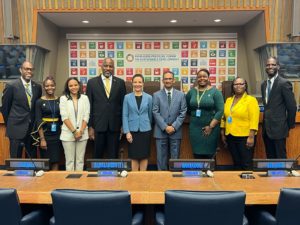
Odean: First of all, libraries are really the vehicle by which all countries will be able to sensitize countries about what is happening and how citizens may get involved. Nonetheless, we needed more time to integrate with other leaders from our countries and to work out how to integrate government delegations fully in order to really interact and share how having librarians at the table can make it manageable to achieve sustainable development goals.
Mara: It struck me that the probability of not achieving the SDGs is high. Violence, disinformation, poverty, inequality, climate issues – the world has come to a certain deadlock, and if there will are not more active and real measures, we will not achieve a sustainable planet. It is important not only to speak great words, but also to take great actions. This also applies to libraries.
Loida: Participation in the HLPF is tremendously significant to connect in-person with UN decision makers, continuing work I’ve done since 2014, and strengthening relationships with libraries. The focus of HLPF2022 was on taking action through these last years of this Decade of Action as the UN has named the 2020-2030 period.
I was honoured to speak at two IFLA events, one on July 7 hosted by IFLA and other global partners. At that one, we shared case-studies of libraries as cultural institutions integrated into local development strategies with IFLA partners. It was amazing to bring attention, at the United Nations, to how libraries are strengthening the central fibre of our societies and contributing to the social and cultural capital of our societies through the work they do daily providing information in different ways and formats.
I also joined the IFLA delegates at an event at the UN Library on July 11 to speak about how the world can build back better through the SDGs and partnering with libraries. A highly visible opportunity to place libraries on the global development agenda!
Premila: It was a great experience – The work done by us (libraries) was highly appreciated. I was invited to attend other events/meetings took place during the Forum but at the very last minute. We need to communicate directly with the national team, engage with them in order to build a strong presence.
What will you do once you get back home to follow up?
Ayanda: I want to organise a round table discussion on these different themes and relate them to the emerging trends in information access and usage; and especially relating the themes to the different SDGs. The target audience will be librarians and the different stakeholders in government and community structures.
I also plan to follow up on relations made with high political and policy entities that I interacted with. I had the opportunity of being part of the Botswana delegation at the briefing of the President and the honourable ministers that accompanied him. I was able to formally introduce IFLA and my role in advocating for inclusion of libraries in the development plan. This was well received and followed by further engagements and formation of working relations.
In particular, I have identified some key contacts to pursue – the person responsible for our Voluntary National Review to identify indicators for assessment on the role of libraries in delivering on the SDGs, the Deputy Permanent Secretary in the Office of the President in order to discuss trends in libraries, the UN Representative to Botswana to discuss trends in libraries and to guide in the development of the UN Library for public access, and the UN Library itself in order to discuss national repositories of UN publications.
I also plan to give guidance to the Sub-Saharan Africa Regional Division Committee about how libraries can engage in Voluntary National Reviews of implementation of the Sustainable Development Goals.
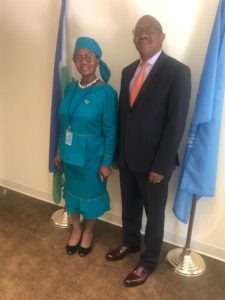
Tseli: I want to consult with three parties: firstly the Ministry of Development that is responsible for the SDGs, second my employer that is both the leading university library in the country and the faculty that teaches library studies; and third the council of NGOs where we are affiliated as the Lesotho Library Association plus the Library Consortium. We should also collaborate among libraries on our own or joint projects. I have already contacted one key government official!
Alejandro: Every semester, in our institution, a monitoring and performance report is made for each activity, framed in terms of one or more SDGs and their targets, and using statistics and indicators that allow their monitoring.
Based on the experience of the HLPF, we will work on observing the results of the impact of the projects we develop, specifically in terms of their contribution to addressing those tendencies that hinder access to information.
On the other hand, as a worker in a parliamentary public library, we must permanently reaffirm transparency in the institution as well as be innovative in creating mechanisms that make it easier for citizens to learn about parliamentary activity and its effects.
Julius: I will push for more awareness of the SDG and create a space in ALA that will be able to follow, report and engage ALA members and US libraries on achieving the SDG’s.
Odean: After sitting in more than 2 Voluntary National Review sessions, listening to small island states share what they are doing and the type of support, I realised there is so much to be done! I have already engaged the Ambassador of the Jamaica Mission to have a Regional session with all libraries across the Caribbean for a more targeted approach to achieving sustainable development goals. The Government Libraries Information Network of Jamaica will coordinate this effort.
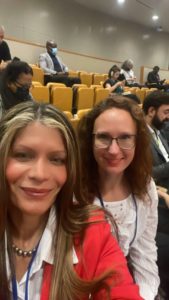
Mara: I will contact Andrejs Pildegovičs, the Ambassador and Permanent Representative to the United Nations in New York from the Republic of Latvia. Unfortunately there was no possibility to meet him during the HLPF, but I will write an email to give some insights in my participation in the HLPF and my input and view on the actual situation and the future of Latvian libraries. As well as I will continue to keep up with activities in the field and cooperate with stakeholders and partners to demonstrate libraries as key players in the achievement of the SDGs.
Loida: I am thrilled to expand on the work started by the ALA UN 2030 Sustainable Development Goals Task Force with which we, as Chair working together with an international team of ALA members, developed a multi-year strategic plan to increase participation by libraries in efforts to achieve the Goals.
I am in a team with fellow ALA Past President Julius C Jefferson and we should disseminate information about the work at the HLPF and the SDGs via different media. For instance, ALA’s Twitter tweeted about our participation and IFLA’s team at the HLPF. Additionally, during the HLPF I was able to connect with USA representatives at the UN and will be following up to build on that for more support for libraries and inclusion of libraries in USA development plans. I am also staying connected with the members of the IFLA delegates team for inspiration!
Premila: None of the VNR presentations that I attended mentioned ‘Libraries’ even though there are reference to libraries in the written publications! We should strengthen our partnership with the National Authority and seek the possibility of getting involved in the review process.
What opportunities do you see for libraries as a whole following HLPF?
Ayanda: There is still a gap on what libraries can offer the community and what policy makers know about libraries. There is a need to inform and educate and inform on the role of libraries. It may help if there can be a side event that is on what libraries do towards delivering on SDGs.
Tseli: All of my above points stress opportunities I created through HLPF. These are not only opportunities for me though, but also for libraries locally and globally.
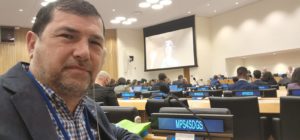
Alejandro: Fundamentally, I want to strengthen joint work with public agencies, especially those in charge of monitoring the 2030 Agenda, as well as promote and consolidate alliances with civil society organizations in order to work together from the perspective of the SDGs.
In the same sense, we should strengthen the participation of citizens in the library, offering clear information about the collection and services, and generate projects that directly involve users, promoting what they learn from their studies and research and, at the same time, time, take their proposals and involving them in projects that make them part of the management.
In addition, my meeting with Ambassador María del Carmen Squeff was very positive, and fruitful. Overall, my participation in the HLPF was a very enriching experience since it could be repeated throughout the region, which is very important for parliamentary libraries.
Julius: Several speakers mentioned the use of data and information when supporting the SDGs. Libraries and library workers have an opportunity to provide accurate authoritative information that can support achieving the SDGs. The SDGs will not be realized without libraries and library workers.
Odean: We need more engagement from the government and private sector, inclusion in our organisations budget to acquire resources to support the SDG goals and objectives; and collaboration across the world between IFLA and all other library communities especially those of us who were at the UN HLPF.
Mara: I hope that libraries have been noticed by politicians and that the support expressed by politicians in words also will be realized in deeds. Actually, libraries are very cross-sectoral institutions and we should use this power of to contribute to the development of our communities and to strengthen the value of SDG-oriented actions in local society. Think global, act local – this motto applies also to libraries. We must not lose neither the local, nor the global perspective of the role of libraries in the achievement of the SDGs.
Loida: HLPF2022 was a great opportunity to meet with librarians moving development efforts in other countries, and identify commonalities, best practices and recommendations from each other that would fuel innovation into ongoing development efforts by library associations and librarians. It is key for library associations to harness the participation of libraries in the HLPF to build on that by speaking with their elected officials about the role of libraries in development plans in other countries and how libraries are development accelerators.
There are many areas that can be common goals between libraries and local governments and libraries should build on that. For example, I was heartened to see a focus on human rights, building back better and smarter after the pandemic, climate change, digital connectivity, peace, supporting young people, and women and girls. These are timely matters that impact all countries, therefore there are many opportunities for libraries to work together with private and public agencies, NGOs, elected officials and UN countries representatives!
Premila: Libraries have the opportunities to engage with authorities and showcase them as valued partners of the development.
